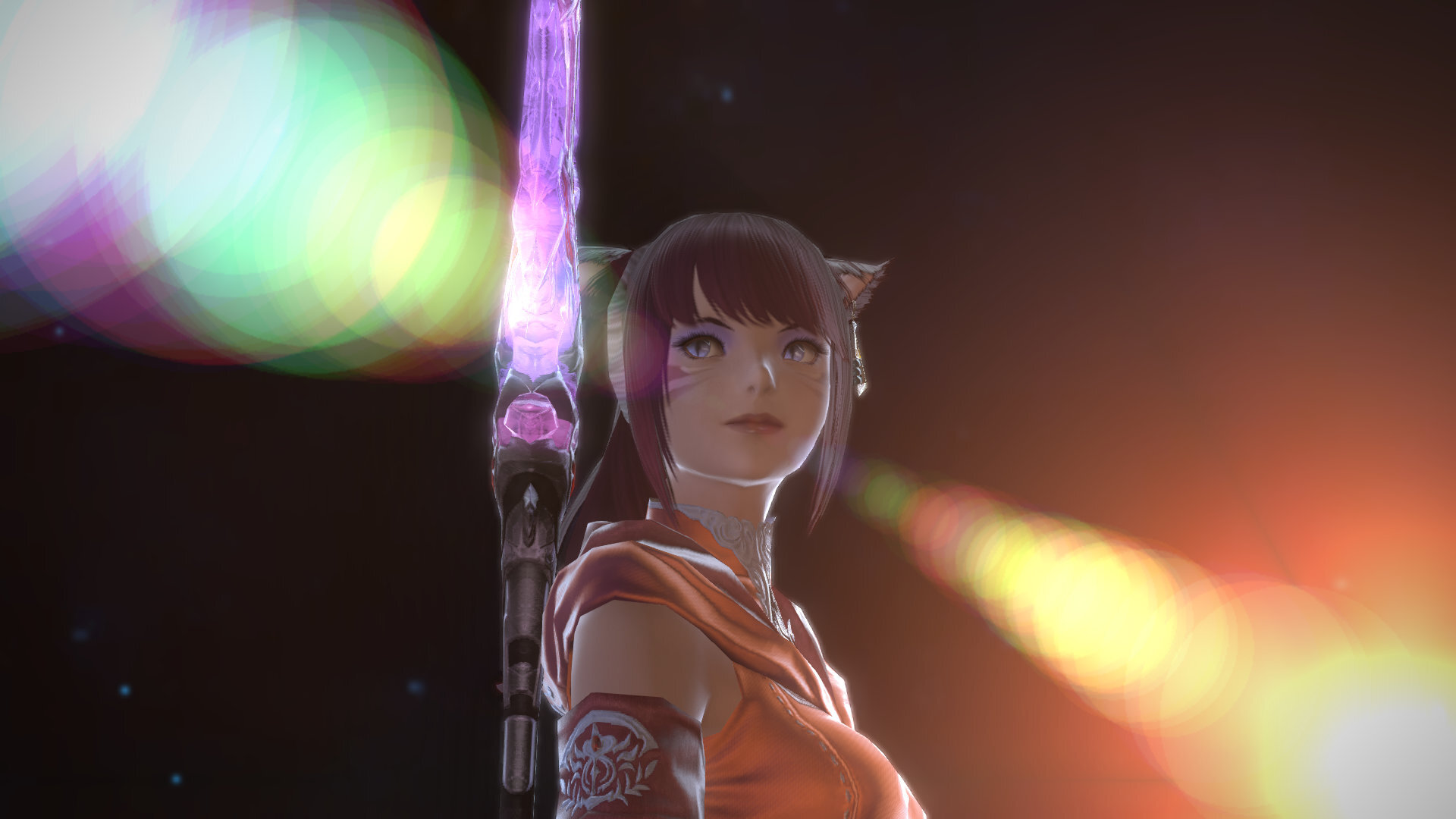I’ve never been a fan of silent protagonists. Even in my early video game days, I was always a little bit disappointed when an RPG hero was mute. There was rarely an in-game explanation for why a character didn’t talk, and the frequent developer rationale of facilitating better immersion for players always felt like an excuse — particularly because everything else about the character was often set, including their appearance, gender, and backstory. It didn’t help that a lot of these silent protagonists were men, and as a woman, I was inherently not going to be able to fully put myself in their shoes by default, so making them mute felt pointless.
Fast forward to 2013, when some friends convinced me to try out a certain critically acclaimed MMORPG you might have heard of. I’ve talked at length about Final Fantasy XIV from a review perspective, but here, I want to talk about the Warrior of Light and why they are such a powerful and fascinating main character, despite being a mostly silent, highly malleable protagonist.
For those unfamiliar with Final Fantasy XIV, the Warrior of Light is a fully customizable character. Players can choose from one of eight races, each of which is further subdivided into two clans that affect appearance and have a negligible effect on stats. After selecting a race, players can then choose a gender and adjust the look of their character before naming them and selecting a starting class, which also determines which city-state they will spend their first 15 levels in.
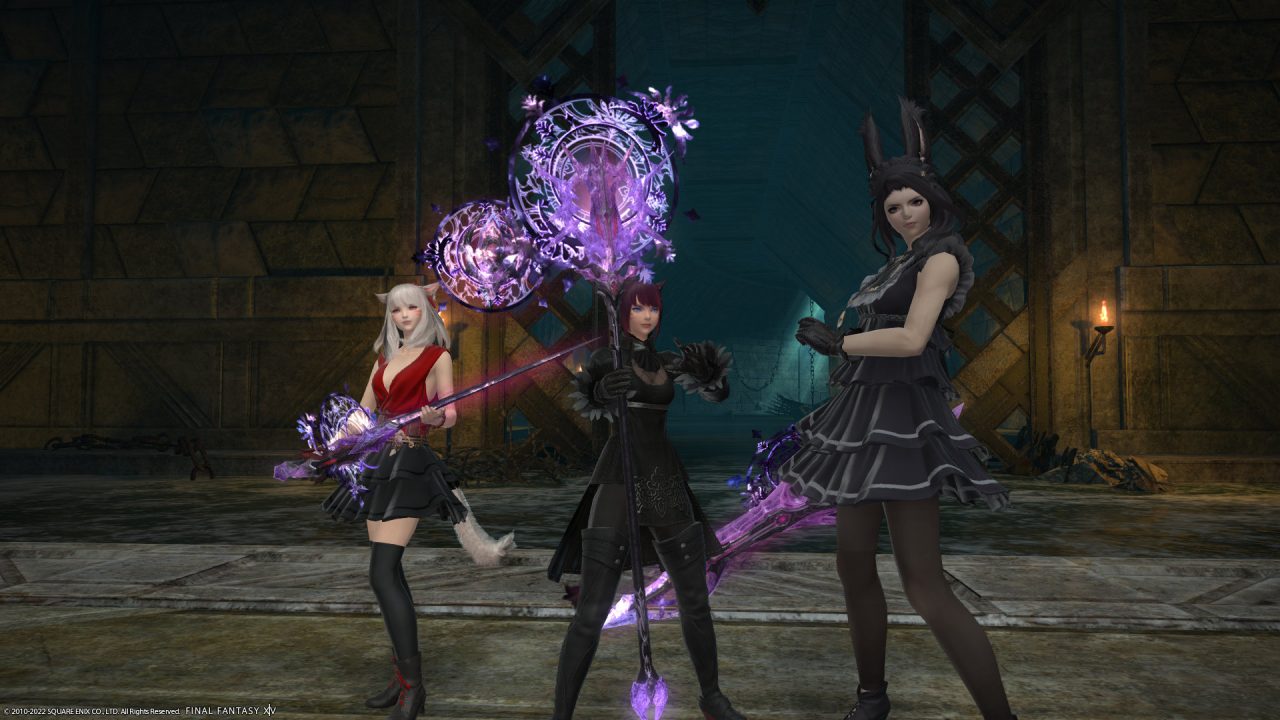
Regardless of where you start in Final Fantasy XIV, your Warrior of Light’s story is essentially the same: you are a wandering adventurer who quickly gets recruited by the Scions of the Seventh Dawn to help deal with primals — think summons — that threaten the land. After defeating several primals, taking on the antagonistic Garlean Empire, and dealing with the mysterious body-swapping Ascians, you save the day and usher in the Seventh Astral Era. And that’s just 2.0! Over the course of the 2.X patches and four expansions, you uncover conspiracies and expose the truth of the Dragonsong War in Ishgard, liberate nations subjugated by the Garleans, avert calamities on distant shards, and learn about the true threat to life on the world you call home.
In A Realm Reborn, the Warrior of Light communicates almost exclusively through emotes. However, beginning in Heavensward, you have a few dialogue options, and in every expansion since, these options have been expanded. These give players more opportunities to express themselves, even if they all essentially boil down to flavor text. Some are even delightfully tongue-in-cheek, serving as cathartic meta-references to the fact that you’re playing an RPG where your character has to do everything for everyone.
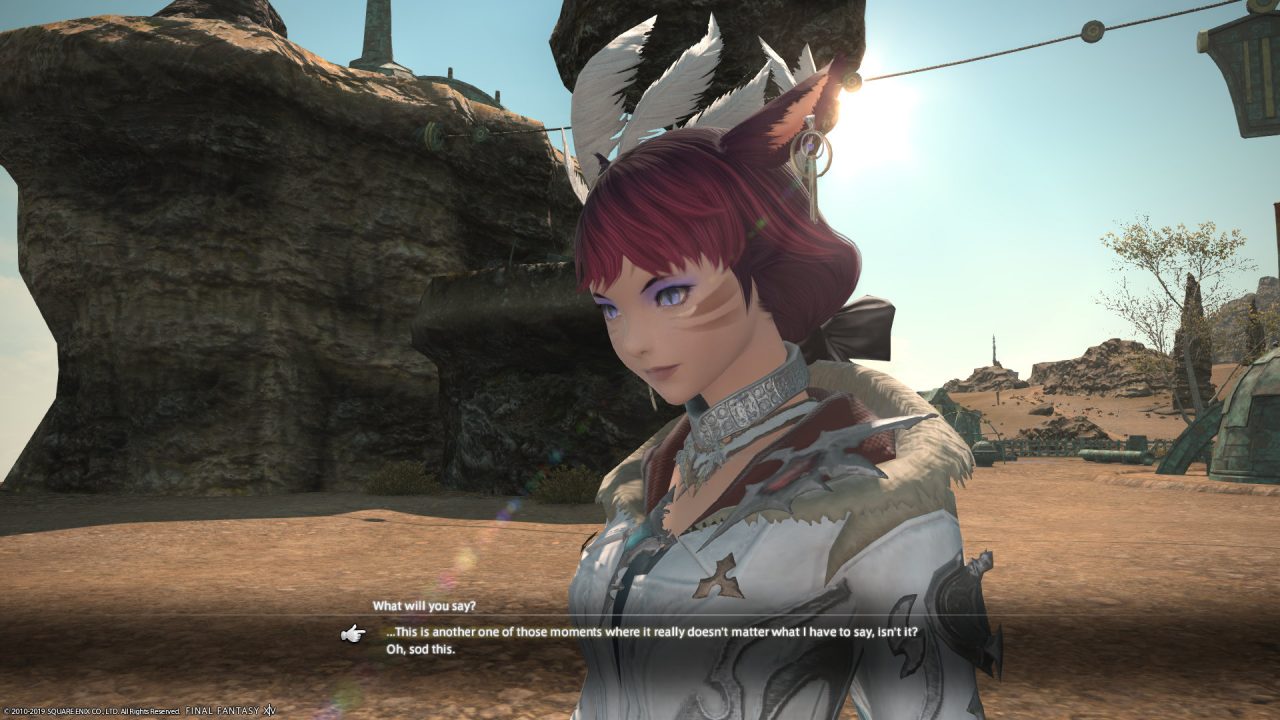
None of these dialogue choices change or significantly impact Final Fantasy XIV’s story, and that’s in keeping with a game that has generally been very careful to allow players to make up their own backstories and headcanons. Everyone’s Warrior of Light experiences the same events and resolves conflicts in the same way, but other than that, players are free to imagine their characters however they like. Dialogue options are thus a tool that allows players to participate more actively in cutscenes and express more of their Warrior of Light’s personality in the process. They also make the awkward act of pantomiming dialogue a little less weird, though there are still plenty of instances of that.
You might wonder how such a malleable character could possibly compare to more defined protagonists in single-player RPGs. I mean, everyone’s headcanon for their Warrior of Light is different, right? The things I imagine my character did before the game, the way she feels about events in the expansions, even the people she likes — all of it could be totally different than your Warrior of Light (if you play) or the random person’s character who I ran a roulette with the other day. So how can I say that the Warrior of Light is a strong character when they’re not just one character but a million different characters?
Well, that’s kind of the brilliant part. The main story sets the big picture elements of the Warrior of Light in stone. They always take down Ultima Weapon, defeat Nidhogg, tussle with Zenos, save the First, and so on. No matter what your headcanons are, they are always the hero, beloved by the Scions, the Eorzean Alliance, countless individuals, and even the occasional enemy. But Final Fantasy XIV mostly leaves the rest up to your imagination. There are no dialogue or character customization options that force you to select a backstory, and despite several NPCs being obviously infatuated with the Warrior of Light, there’s no romance or social link systems — not that I’m necessarily opposed to either, mind you. The end result is that you can make your Warrior of Light whoever you want them to be, as a person, while still getting to witness them save the day time and time again.
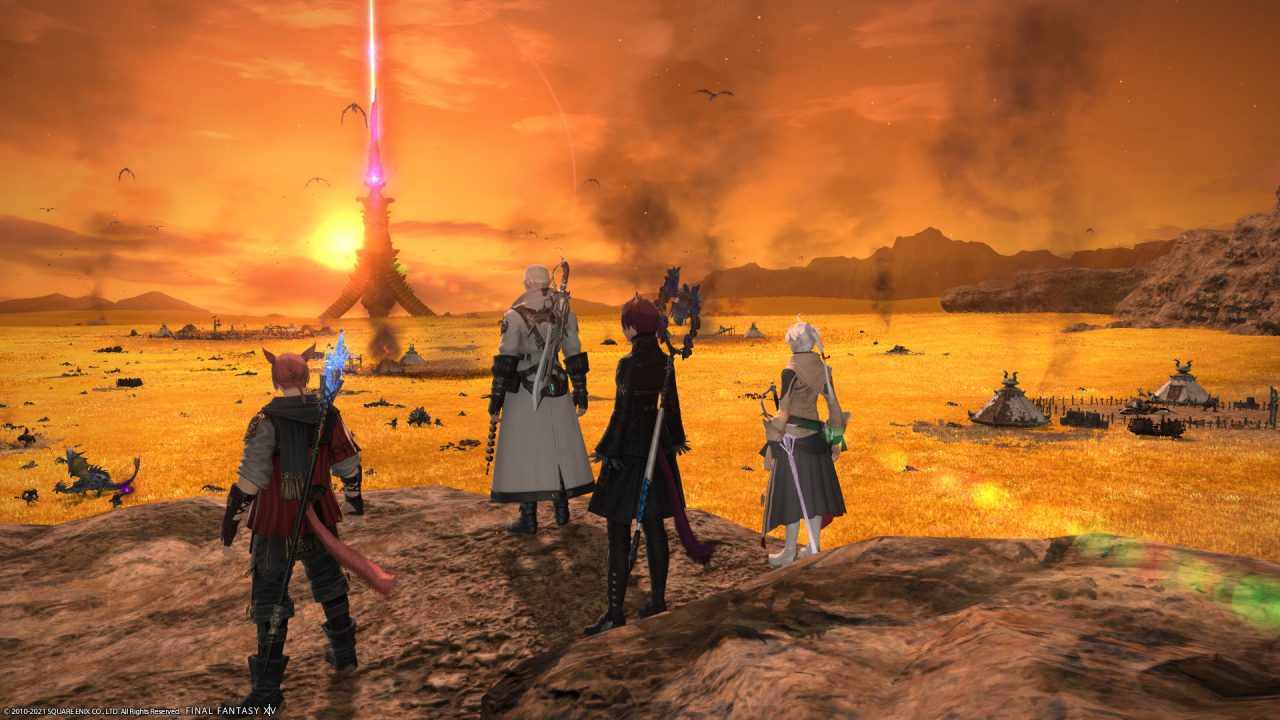
There’s something pretty special about that. My Warrior of Light is uniquely mine, and unlike other RPGs with customizable protagonists, I don’t feel like I’m playing a character — I’m playing myself. And I don’t even really mean that in a self-insert kind of way, though that is certainly a valid way to play Final Fantasy XIV. I’ve never thought of my Warrior of Light as me, but I have thought of myself as her — if that makes sense. Regardless of how you want to conceptualize it, the experience feels more personal than it otherwise might with an established character, yet it feels no less epic. At times, I’ve even felt more hyped and emotional about the events my Warrior gets herself into than I’ve ever felt for another character.
At this point, you might be asking, “How is this different from other RPGs that let you customize your character and roleplay?” People have plenty of headcanons for BioWare protagonists like Commander Shepard or Bethesda’s Dragonborn, so is Final Fantasy XIV’s Warrior of Light even all that different? Well, I think there are two key aspects that make the character feel distinct.
First, because Final Fantasy XIV is an MMO, you naturally spend a lot of time with your character, even compared to someone in a trilogy like Mass Effect. I’ve been playing Final Fantasy XIV for over eight years, and in that time, I’ve seen how the game’s long-form narrative benefits the Warrior of Light as a character. Every crisis you solve and primal you fight builds your reputation and strengthens your relationship with your allies.
Some of these allies, like the Leveilleur twins, have been with you almost since the beginning of A Realm Reborn and have seen both you and themselves through good times and bad. Alphinaud, in particular, is a great example because just as he has stayed by your side in your darkest moments, you have seen him at his worst. So when Alphinaud talks about your friendship in Endwalker, it doesn’t feel like a cliche — it feels real because the game makes you take the time to earn it. Part of that is down to the excellent writing, but Final Fantasy XIV is also just willing to take the time necessary to develop the world and your character’s place in it.
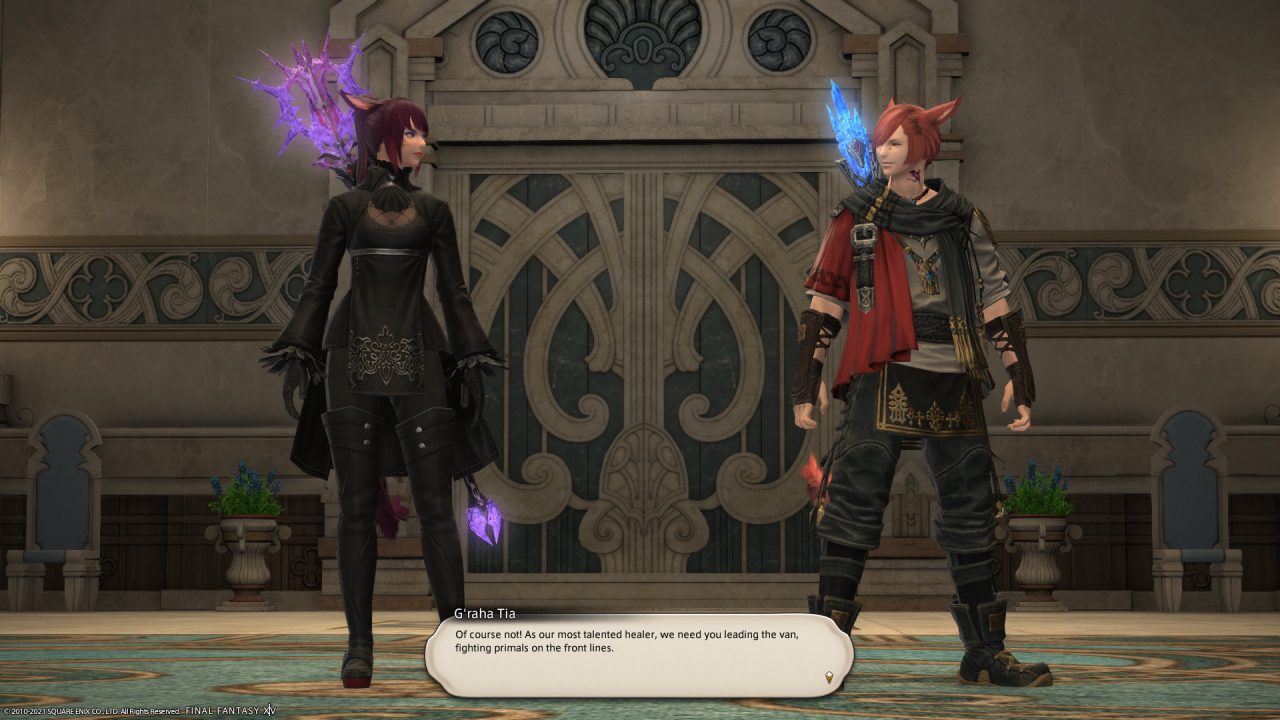
You don’t always spend your time saving the world, either. You can ignore the main story and become a renowned crafter or gatherer, travel the realm delivering mail, assist the various tribes with their problems, and help out with local seasonal festivities. Though these activities may sound mundane, they are another avenue that allows you to feel like you are a part of this world. Being recognized by NPCs not just for your heroic, world-saving feats but also for the little things you can do to pass the time between crises aids in this immersion.
Second, I think the Warrior of Light being a mostly silent protagonist is key. It may seem odd for me to say that, given my dislike of silent protagonists in general, but I believe their muteness ties everything together in Final Fantasy XIV. Unlike many silent protagonists I played as when I was younger, you absolutely can make this hero your own. Having them be silent facilitates rather than detracts from the experience in a way that I wouldn’t have expected before I started playing the game.
Sure, when I was a fresh sprout, I was a bit disheartened that my character just pantomimed everything. But over time, it became almost natural. I still appreciate dialogue choices when presented, but I’ve found that when my character emotes, I know what they are saying because it feels like they’re speaking the lines. Or, at the very least, I can easily imagine what they would say. Fleshing out my Warrior’s personality, backstory, and relationships with little headcanons, has become part of my experience playing Final Fantasy XIV, and it’s always interesting to see how other players view their own Warriors. We’ve all experienced the same significant events, but every Warrior feels unique and personal to their player in a way that wouldn’t be the same if they weren’t mostly silent. Sometimes less is more, and believe me, I’m amazed that I can say that about a silent protagonist of all things.
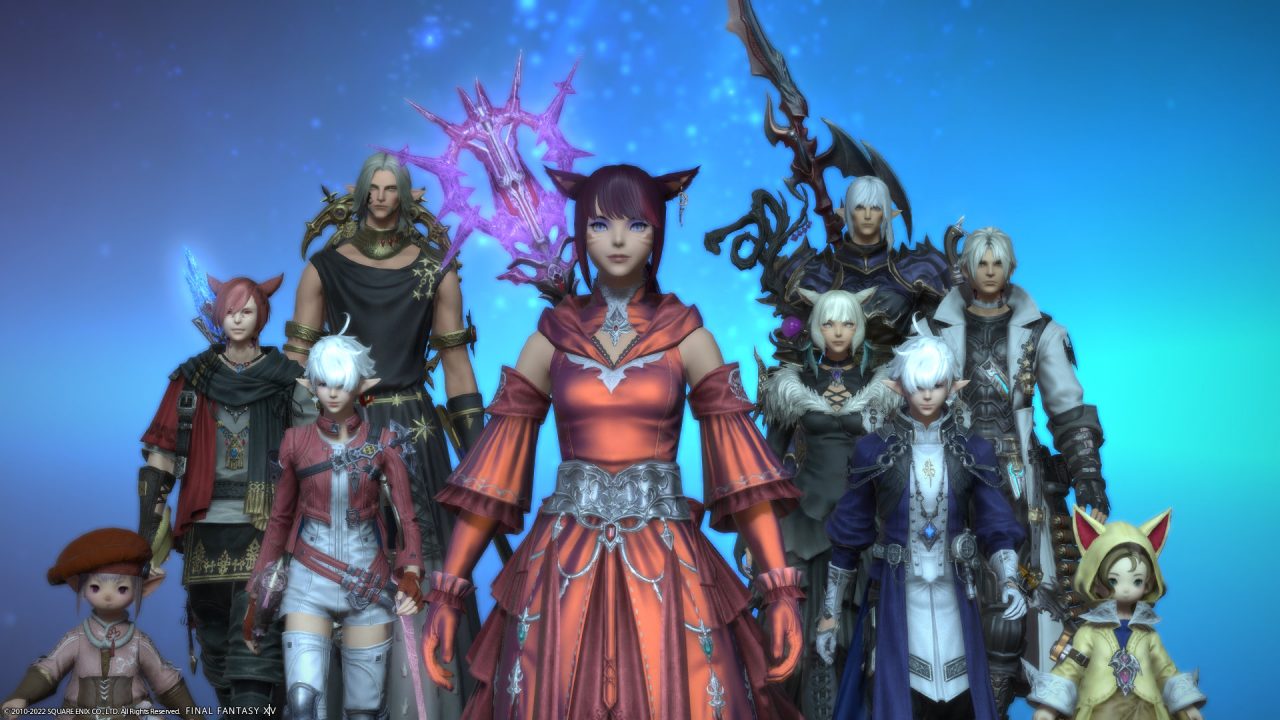
Now, I know that much of what I’ve said probably doesn’t sound that special to those who have played MMOs before. After all, long stories and character customization are staples of the genre. I’ll freely admit that Final Fantasy XIV is the first MMO I’ve really sunk my teeth into, and maybe that’s partly why the Warrior of Light is so important to me. I never expected to find myself so engrossed in an MMO’s story, and I certainly never thought I’d connect with a character who barely speaks. But Final Fantasy XIV has a way of surpassing expectations, a sentiment I’ve often expressed in my reviews of new expansions and patches.
With patch 6.1 starting a new narrative arc, I find myself excited to see what adventures await my Warrior of Light. I feel like I’ve grown to be a part of this world just like my character has, and as a certain Ascian alluded to in Endwalker, there’s still much to see and do, even just on the Source. I look forward to learning more about the world, but mostly, I look forward to learning more about my character and, through her, myself.
So here’s to the Warrior of Light, who taught me that not all silent protagonists are bad and that there is something truly powerful about shaping a character into your own personal hero.

